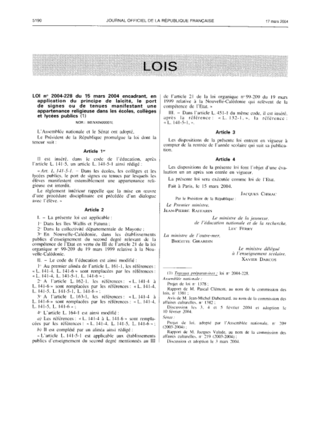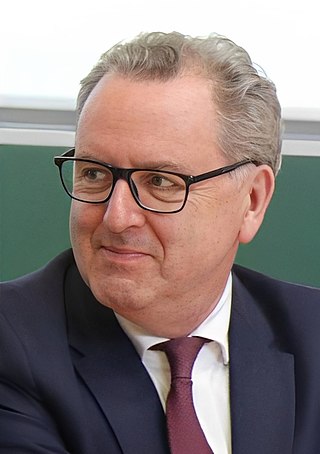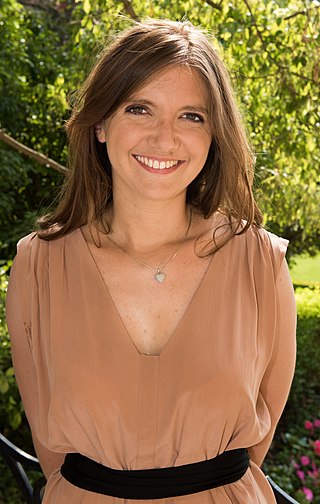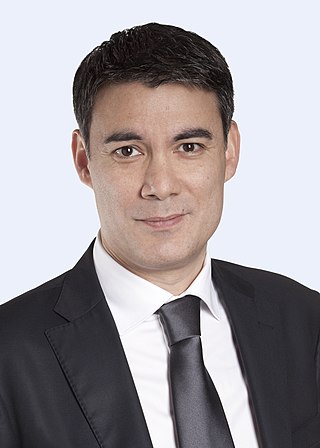Related Research Articles

The French law on secularity and conspicuous religious symbols in schools bans wearing conspicuous religious symbols in French public primary and secondary schools. The law is an amendment to the French Code of Education that expands principles founded in existing French law, especially the constitutional requirement of laïcité: the separation of state and religious activities.
Islamic clothing is clothing that is interpreted as being in accordance with the teachings of Islam. Muslims wear a wide variety of clothing, which is influenced not only by religious considerations, but also by practical, cultural, social, and political factors. In modern times, some Muslims have adopted clothing based on Western traditions, while others wear modern forms of traditional Muslim dress, which over the centuries has typically included long, flowing garments. Besides its practical advantages in the climate of the Middle East, loose-fitting clothing is also generally regarded as conforming to Islamic teachings, which stipulate that body areas which are sexual in nature must be hidden from public view. Traditional dress for Muslim men has typically covered at least the head and the area between the waist and the knees, while women's islamic dress is to conceal the hair and the body from the ankles to the neck. Some Muslim women also cover their face. However, other Muslims believe that the Quran does not mandate that women need to wear a hijab or a burqa.

In France, there is an ongoing social, political, and legal debate concerning the wearing of the hijab and other forms of Islamic coverings in public. The cultural framework of the controversy can be traced to France's history of colonization in North Africa, but escalated into a significant public debate in 1989 when three girls were suspended from school for refusing to remove their headscarves. That incident, referred to in France as l'affaire du foulard or l'affaire du voile, initially focused the controversy on the wearing of the hijab in French public schools. Because of the wide-ranging social debates caused by the controversy, l'affaire du foulard has been compared to the Dreyfus affair in its impact on French culture.

Various styles of head coverings, most notably the khimar, hijab, chador, niqab, paranja, yashmak, tudong, shayla, safseri, carşaf, haik, dupatta, boshiya and burqa, are worn by Muslim women around the world, where the practice varies from mandatory to optional or restricted in different majority Muslim and non-Muslim countries.

RT France, also known as RT en français, was the French version of the Russian state-controlled news channel RT. The channel was based in the Paris suburb of Boulogne-Billancourt and was funded by the Russian government.

Renaissance (RE) is a liberal and centrist political party in France. The party was originally known as En Marche ! and later La République En Marche ! before adopting its current name in September 2022.

Richard Ferrand is a French politician of La République En Marche! (LREM) who served as President of the National Assembly from 2018 to 2022. He had served as a member of the National Assembly for Finistère's 6th constituency from 2012 to 2022. A longtime member of the Socialist Party, he was LREM's General Secretary from October 2016. He briefly served as Minister for the Cohesion of Territories between May and June 2017 before resigning due to nepotism accusations. Following his resignation, he became the leader of the party's group in the National Assembly in June 2017 and then was elected to the Chamber's Presidency in September 2018.

Mounir Mahjoubi is a French entrepreneur and politician of La République En Marche! (LREM) who served as a member of the National Assembly from June to July 2017 and from 2019 to 2022. From 2017 until 2019 was the Secretary of State for Digital Affairs in the government of Prime Minister Édouard Philippe.

Stéphane Trompille is a French politician of La République En Marche! (LREM) who served as a member of the French National Assembly from 2017 to 2022, representing the department of Ain.

Éric Bothorel is a French politician of La République En Marche! (LREM) who has been serving as a member of the French National Assembly since the 2017 elections, representing the department of Côtes-d'Armor.

Coralie Dubost is a French jurist and politician who served as the member of National Assembly for the 3rd constituency of the Hérault department from 2017 to 2022. She is a member of La République En Marche! (LREM). Accused of mismanagement of her mandate fees, she announced her withdrawal from the political scene three weeks prior to the 2022 legislative election, declining to run for reelection to a second term in office.

François Jolivet is a French politician of La République En Marche! (LREM) who was elected to the French National Assembly on 18 June 2017, representing the department of Indre.

Stanislas Guerini is a French politician who served as Minister of Public Transformation and Service in the government of Prime Minister Élisabeth Borne from 2022 to 2024.

Anne-Christine Lang is a French politician who has been serving as a member of the National Assembly for Paris since 2014. A member of the Socialist Party (PS) until she joined La République En Marche! (LREM) in 2017, she first represented the 9th constituency as Jean-Marie Le Guen's substitute following his appointment as Secretary of State for Relations with Parliament by President François Hollande. In the 2017 legislative election, she ran in the neighbouring 10th constituency, which covers parts of the 13th and 14th arrondissements. Lang also served as a Councillor of Paris from 2001 until 2020.

Aurore Bergé is a French politician who has been serving as Minister for Gender Equality and Fight against discriminations in the government of Prime Minister Gabriel Attal since January 2024.

Sacha Houlié is a French lawyer and politician of La République En Marche! (LREM) who has been serving as a member of the French National Assembly since the 2017 elections, representing the department of Vienne.
Cécile Rilhac is a French politician of La République En Marche! (LREM) who has been serving as a member of the French National Assembly since 18 June 2017, representing the department of Val-d'Oise.
Aurélien Taché is a French politician who was elected to the French National Assembly on 18 June 2017, representing the department of Val-d'Oise. He was elected in 2017 as a member of La République En Marche! (LREM) but left the party in 2020, and joined the short-lived Ecology Democracy Solidarity group, then The New Democrats. In 2022, we was re-elected as a New Democrat, as part of the NUPES group.

Regional elections were held in France on 20 June and 27 June 2021. At stake were the regional councils in metropolitan and overseas France including the Corsican Assembly, Assembly of French Guiana and Assembly of Martinique, all for a six-year term. The Departmental Council of Mayotte, which also exercises the powers of a region, also participated in this election, because the departmental elections were held at the same time. Eighteen regional presidencies were at stake, with thirteen in mainland France and Corsica, as well as five overseas. Though they do not have legislative autonomy, these territorial collectivities manage sizable budgets. Moreover, regional elections are often perceived as a mid-term opinion poll. Due to the COVID-19 pandemic, the regional and departmental elections were postponed, first to 13 and 20 June 2021 and then to 20 and 27 June 2021.

Sabrina Agresti-Roubache is a French film producer and politician of LREM who has been serving as Minister Delegate for Citizenship and Urban Development in the government of Prime Minister of Élisabeth Borne since 2023. She previously was a member of the National Assembly from 2022 to 2023, representing Bouches-du-Rhône's 1st constituency.
References
- 1 2 3 Méheut, Constant; Jaques, Monique (18 April 2022). "The Female Soccer Players Challenging France's Hijab Ban". The New York Times.
- ↑ Sakho, Kadiatou. "Les Hijabeuses, ces footballeuses qui luttent contre leur mise au banc". Libération (in French). Retrieved 9 May 2022.
- ↑ Williams, Jessie (21 June 2021). "Les Hijabeuses: the female footballers tackling France's on-pitch hijab ban". the Guardian. Retrieved 4 May 2022.
- ↑ Durie, Alexander. "Les Hijabeuses: Muslim women footballers tackle French hijab ban". AlJazeera. Retrieved 4 May 2022.
- 1 2 3 Amy, Woodyatt; Bashir, Nada; Mawad, Dalal. "French lawmakers have proposed a hijab ban in competitive sports. The impact on women could be devastating". CNN. Retrieved 9 May 2022.
- ↑ Lacides, Luigy (26 January 2022). "Ces footballeuses jouent devant le Sénat pour réclamer de porter le voile sur le terrain". Le HuffPost (in French). Retrieved 9 May 2022.
- ↑ "Laissez jouer les hijabeuses!". Libération (in French). Retrieved 9 May 2022.
- 1 2 "French Equality Minister backs the right for women to play football in veils". RFI. 11 February 2022. Retrieved 9 May 2022.
- 1 2 3 Boichot, Loris (11 February 2022). "La majorité s'emmêle autour du voile dans le sport". LeFigaro (in French). Retrieved 9 May 2022.
- ↑ Trindade, Júlia Belas (4 May 2022). "Moving the Goalposts | 'It's brutal' – how French football's hijab ban is affecting Muslim women". the Guardian. Retrieved 4 May 2022.
- ↑ "French court upholds ban on hijabs at matches". ESPN.com. 29 June 2023. Retrieved 30 June 2023.
- ↑ "Le Conseil d'Etat maintient l'interdiction du hijab en compétition de foot". Les Echos (in French). 29 June 2023. Retrieved 30 June 2023.
- ↑ "Football : le Conseil d'État confirme l'interdiction du hijab en compétition". France 24 (in French). 29 June 2023. Retrieved 30 June 2023.